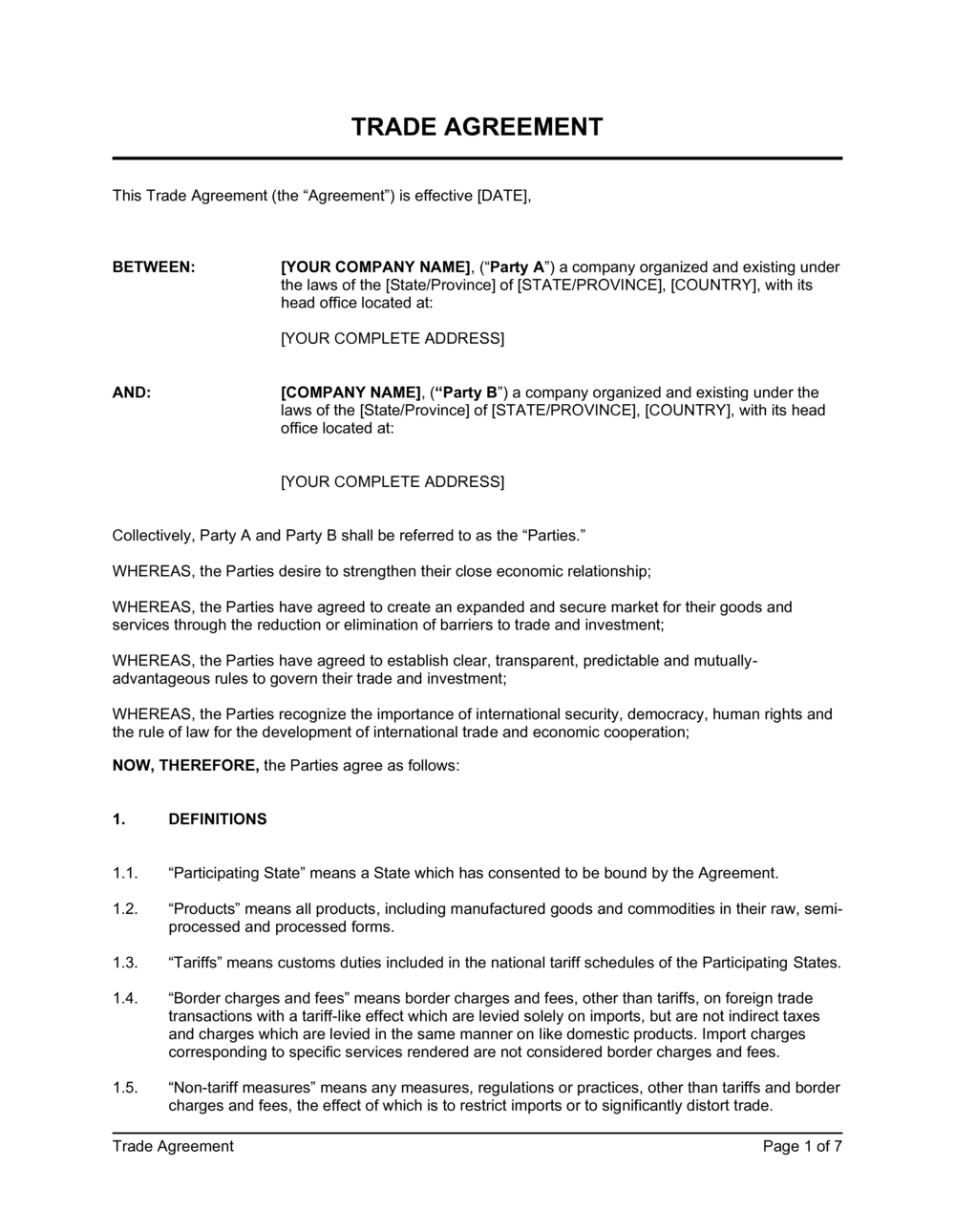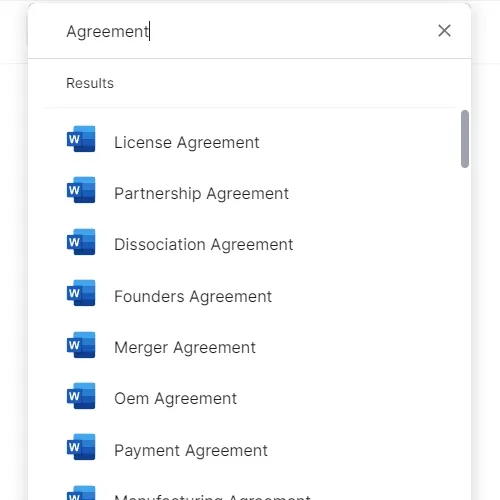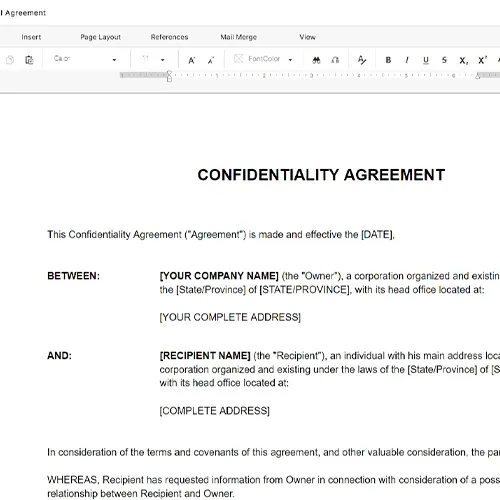Trade Agreement Template

Document content
This trade agreement template has 7 pages and is a MS Word file type listed under our legal agreements documents.
Sample of our trade agreement template:
TRADE AGREEMENT This Trade Agreement (the "Agreement") is effective [DATE], BETWEEN: [YOUR COMPANY NAME], ("Party A") a company organized and existing under the laws of the [State/Province] of [STATE/PROVINCE], [COUNTRY], with its head office located at: [YOUR COMPLETE ADDRESS] AND: [COMPANY NAME], ("Party B") a company organized and existing under the laws of the [State/Province] of [STATE/PROVINCE], [COUNTRY], with its head office located at: [YOUR COMPLETE ADDRESS] Collectively, Party A and Party B shall be referred to as the "Parties." WHEREAS, the Parties desire to strengthen their close economic relationship; WHEREAS, the Parties have agreed to create an expanded and secure market for their goods and services through the reduction or elimination of barriers to trade and investment; WHEREAS, the Parties have agreed to establish clear, transparent, predictable and mutually-advantageous rules to govern their trade and investment; WHEREAS, the Parties recognize the importance of international security, democracy, human rights and the rule of law for the development of international trade and economic cooperation; NOW, THEREFORE, the Parties agree as follows: DEFINITIONS "Participating State" means a State which has consented to be bound by the Agreement. "Products" means all products, including manufactured goods and commodities in their raw, semi-processed and processed forms. "Tariffs" means customs duties included in the national tariff schedules of the Participating States. "Border charges and fees" means border charges and fees, other than tariffs, on foreign trade transactions with a tariff-like effect which are levied solely on imports, but are not indirect taxes and charges which are levied in the same manner on like domestic products. Import charges corresponding to specific services rendered are not considered border charges and fees. "Non-tariff measures" means any measures, regulations or practices, other than tariffs and border charges and fees, the effect of which is to restrict imports or to significantly distort trade. "Serious injury" means significant damage to domestic producers of like or similar products resulting from a substantial increase of preferential imports in situations which cause substantial losses in terms of earnings, production or employment unsustainable in the short term. The examination of the impact on the domestic industry concerned shall also include an evaluation of other relevant economic factors and indices having a bearing on the state of the domestic industry of that product. "Threat of serious injury" means a situation in which a substantial increase of preferential imports is of a nature to cause serious injury to domestic producers, and that such injury, although not yet existing, is clearly imminent. A determination of threat of serious injury shall be based on facts and not on mere allegations, conjecture, or remote or hypothetical possibility. OBJECTIVES The objectives of this Agreement are to promote economic development through a continual process of trade expansion among the countries and to further international economic co-operation through the adoption of mutually beneficial trade liberalization measures consistent with their respective present and future development and trade needs. PRINCIPLES The Agreement shall be based on overall reciprocity and mutuality of advantages in such a way as to benefit equitably all Participating States; The principles of Transparency, National Treatment and Most-Favored Nation ("MFN") Treatment shall apply to the trade relations among the Participating States. NEGOTIATION OF CONCESSIONS This Agreement may, inter-alia, consist of arrangements relating to: (a) tariffs; (b) border charges and fees; and (c) non-tariff measures. Participating States may conduct their negotiations for tariff concessions in accordance with any one or a combination of the following approaches and procedures: (a) product-by-product basis; (b) across-the-board tariff reductions; or (c) sectoral basis. The tariff negotiations should be based on the current MFN rates applied by each Participating State. Participating States shall enter into periodic negotiations with a view to further expanding this Agreement and the fuller attainment of its aims. APPLICATION OF CONCESSIONS Each Participating State shall apply such tariff, border charge and fee, and nontariff concessions in favour of the goods originating in all other Participating States as are set out in its National List of Concessions. These National Lists of Concessions are attached as Annexure A, which is an integral part of this Agreement. NON-TARIFF MEASURES Each Participating State shall take appropriate measures, consistent with its development needs and objectives, for the gradual relaxation of non-tariff measures which may affect the importation of products covered by its National List of Concessions. Issues relating to technical barriers to trade and sanitary and phytosanitary measures among Participating States shall be dealt with, as far as practicable, in accordance with the WTO provisions on these subjects. Participating States shall also make available to one another on a transparent basis a list of non-tariff measures existing on conceded products. PRESERVATION OF THE VALUE OF THE CONCESSIONS Except as provided for elsewhere, in order to secure preservation of the value of the concessions set out in the attached National Lists of Concessions, the Participating States shall not abrogate or reduce the value of these concessions after the entry into force of this Agreement through the application of any charge or measure restricting commerce other than those existing prior thereto, except where a charge corresponds to: (a) an internal tax imposed on a similar domestic product; (b) an anti-dumping or countervailing duty; or (c) fees commensurate with the cost of services rendered. RE-ESTABLISHMENT OF MARGINS OF PREFERENCE If, as a result of a tariff revision, a Participating State reduces or abrogates the value of the concessions granted to the other Participating States, it shall within a reasonable period of time take mutually acceptable compensatory action to reestablish margins of preference of equivalent value or enter into prompt consultations with the other Participating States in order to negotiate a mutually satisfactory modification of its National List of Concessions. For the purposes of this article, a reasonable period of time means not exceeding six (6) months from the date of issue of the notification of tariff revision. A Participating State exceeding this period shall provide justification as to the reasons thereof. COVERAGE OF THE AGREEMENT The Agreement shall cover all products including manufactured goods and commodities in their raw, semi-processed and processed forms. Participating States shall explore further areas of cooperation with regard to border and non-border measures to supplement and complement the liberalization of trade. These may include, among others, the harmonization of standards, mutual recognition of tests and certification of products, macroeconomic consultations, trade facilitation measures and trade in services. SUSPENSION OF CONCESSIONS
3,000+ Templates & Tools to Help You Start, Run & Grow Your Business

Document content
This trade agreement template has 7 pages and is a MS Word file type listed under our legal agreements documents.
Sample of our trade agreement template:
TRADE AGREEMENT This Trade Agreement (the "Agreement") is effective [DATE], BETWEEN: [YOUR COMPANY NAME], ("Party A") a company organized and existing under the laws of the [State/Province] of [STATE/PROVINCE], [COUNTRY], with its head office located at: [YOUR COMPLETE ADDRESS] AND: [COMPANY NAME], ("Party B") a company organized and existing under the laws of the [State/Province] of [STATE/PROVINCE], [COUNTRY], with its head office located at: [YOUR COMPLETE ADDRESS] Collectively, Party A and Party B shall be referred to as the "Parties." WHEREAS, the Parties desire to strengthen their close economic relationship; WHEREAS, the Parties have agreed to create an expanded and secure market for their goods and services through the reduction or elimination of barriers to trade and investment; WHEREAS, the Parties have agreed to establish clear, transparent, predictable and mutually-advantageous rules to govern their trade and investment; WHEREAS, the Parties recognize the importance of international security, democracy, human rights and the rule of law for the development of international trade and economic cooperation; NOW, THEREFORE, the Parties agree as follows: DEFINITIONS "Participating State" means a State which has consented to be bound by the Agreement. "Products" means all products, including manufactured goods and commodities in their raw, semi-processed and processed forms. "Tariffs" means customs duties included in the national tariff schedules of the Participating States. "Border charges and fees" means border charges and fees, other than tariffs, on foreign trade transactions with a tariff-like effect which are levied solely on imports, but are not indirect taxes and charges which are levied in the same manner on like domestic products. Import charges corresponding to specific services rendered are not considered border charges and fees. "Non-tariff measures" means any measures, regulations or practices, other than tariffs and border charges and fees, the effect of which is to restrict imports or to significantly distort trade. "Serious injury" means significant damage to domestic producers of like or similar products resulting from a substantial increase of preferential imports in situations which cause substantial losses in terms of earnings, production or employment unsustainable in the short term. The examination of the impact on the domestic industry concerned shall also include an evaluation of other relevant economic factors and indices having a bearing on the state of the domestic industry of that product. "Threat of serious injury" means a situation in which a substantial increase of preferential imports is of a nature to cause serious injury to domestic producers, and that such injury, although not yet existing, is clearly imminent. A determination of threat of serious injury shall be based on facts and not on mere allegations, conjecture, or remote or hypothetical possibility. OBJECTIVES The objectives of this Agreement are to promote economic development through a continual process of trade expansion among the countries and to further international economic co-operation through the adoption of mutually beneficial trade liberalization measures consistent with their respective present and future development and trade needs. PRINCIPLES The Agreement shall be based on overall reciprocity and mutuality of advantages in such a way as to benefit equitably all Participating States; The principles of Transparency, National Treatment and Most-Favored Nation ("MFN") Treatment shall apply to the trade relations among the Participating States. NEGOTIATION OF CONCESSIONS This Agreement may, inter-alia, consist of arrangements relating to: (a) tariffs; (b) border charges and fees; and (c) non-tariff measures. Participating States may conduct their negotiations for tariff concessions in accordance with any one or a combination of the following approaches and procedures: (a) product-by-product basis; (b) across-the-board tariff reductions; or (c) sectoral basis. The tariff negotiations should be based on the current MFN rates applied by each Participating State. Participating States shall enter into periodic negotiations with a view to further expanding this Agreement and the fuller attainment of its aims. APPLICATION OF CONCESSIONS Each Participating State shall apply such tariff, border charge and fee, and nontariff concessions in favour of the goods originating in all other Participating States as are set out in its National List of Concessions. These National Lists of Concessions are attached as Annexure A, which is an integral part of this Agreement. NON-TARIFF MEASURES Each Participating State shall take appropriate measures, consistent with its development needs and objectives, for the gradual relaxation of non-tariff measures which may affect the importation of products covered by its National List of Concessions. Issues relating to technical barriers to trade and sanitary and phytosanitary measures among Participating States shall be dealt with, as far as practicable, in accordance with the WTO provisions on these subjects. Participating States shall also make available to one another on a transparent basis a list of non-tariff measures existing on conceded products. PRESERVATION OF THE VALUE OF THE CONCESSIONS Except as provided for elsewhere, in order to secure preservation of the value of the concessions set out in the attached National Lists of Concessions, the Participating States shall not abrogate or reduce the value of these concessions after the entry into force of this Agreement through the application of any charge or measure restricting commerce other than those existing prior thereto, except where a charge corresponds to: (a) an internal tax imposed on a similar domestic product; (b) an anti-dumping or countervailing duty; or (c) fees commensurate with the cost of services rendered. RE-ESTABLISHMENT OF MARGINS OF PREFERENCE If, as a result of a tariff revision, a Participating State reduces or abrogates the value of the concessions granted to the other Participating States, it shall within a reasonable period of time take mutually acceptable compensatory action to reestablish margins of preference of equivalent value or enter into prompt consultations with the other Participating States in order to negotiate a mutually satisfactory modification of its National List of Concessions. For the purposes of this article, a reasonable period of time means not exceeding six (6) months from the date of issue of the notification of tariff revision. A Participating State exceeding this period shall provide justification as to the reasons thereof. COVERAGE OF THE AGREEMENT The Agreement shall cover all products including manufactured goods and commodities in their raw, semi-processed and processed forms. Participating States shall explore further areas of cooperation with regard to border and non-border measures to supplement and complement the liberalization of trade. These may include, among others, the harmonization of standards, mutual recognition of tests and certification of products, macroeconomic consultations, trade facilitation measures and trade in services. SUSPENSION OF CONCESSIONS
Easily Create Any Business Document You Need in Minutes.

Access over 3,000+ business and legal templates for any business task, project or initiative.

Customize your ready-made business document template and save it in the cloud.

Share your files and folders with your team. Create a space of seamless collaboration.
Templates and Tools to Manage Every Aspect of Your Business.
Business in a Box Covers Every Business Department
Includes 16 Types of Business Documents You Need
and Achieve Your Business Goals Faster.
